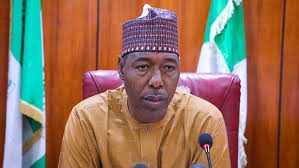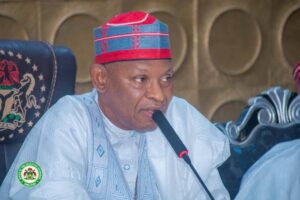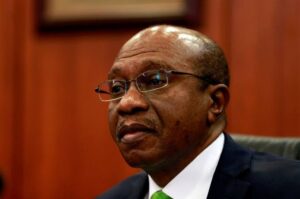

Passing new tax bill into law will have consequences, only Lagos, Rivers will benefit — Zulum
…Atiku urges transparency, calls for inclusive stakeholder engagement
…Dep. Senate President defends bills, dismisses critics as misunderstanding legislation
…PDP chieftain warns that new reform could deepen Northern poverty, aggravate insecurity
By Seun Ibiyemi
Governor Babagana Umara Zulum of Borno State has warned that the proposed new tax reform bill, if passed into law, will have dire economic consequences for Nigeria, particularly for states in the northern region.
According to Zulum, while states like Lagos and Rivers stand to benefit significantly from the bill, the majority of other states, especially those with weak Internally Generated Revenue (IGR), will be left at a disadvantage.
The governor’s statement comes amid growing opposition from various stakeholders, who argue that the tax system will worsen existing regional inequalities and hinder economic development in less prosperous states.
Meanwhile, Former Vice President Atiku Abubakar has weighed in on the ongoing public discourse surrounding the Tax Reform Bills, emphasising the need for a fair and equitable fiscal system.
In a statement made available to NewsDirect, he highlighted the unity among Nigerians in demanding a tax structure that fosters justice and equity without deepening regional disparities.
Atiku stressed that the proposed reforms must not disproportionately benefit certain states while penalising others.
He called for objectivity and transparency in the public hearing process being organised by the National Assembly, urging lawmakers to prioritise open and inclusive participation.
“Transparency and objectivity are essential for promoting accountability, good governance, and public trust in policy-making,” Abubakar said, underscoring the importance of involving civil society organisations, traditional institutions, public officials, and policy experts in the deliberations.
He also urged the National Assembly to revisit and publicly share the resolutions of the National Economic Council, which he described as a critical advisory body on the nation’s economic policies.
Abubakar concluded by calling on lawmakers to ensure that the final content of the Tax Reform Bills aligns with the broader interests of Nigerians, reflecting the principles of justice, equity, and inclusive development.
In the same vein, Senator Barau Jibrin, the Deputy President of the Senate, has defended the Tax Reform Bills currently under review in the National Assembly, responding to critics who claim the legislation could harm the nation’s economy, especially in the North. Barau criticised those who oppose the bills, asserting that many critics, including some lawmakers, misunderstand the content of the bills that were introduced by President Bola Tinubu in September.
In an interview on BBC Hausa, Barau explained that the quick passage of the bills for a second reading was designed to allow the public to provide feedback and make suggestions before the bills are fully debated and amended.
He stated that this stage of the process is necessary to allow for public participation, as it creates an opportunity for Nigerians to express their views on the bills before they are sent to the committee for detailed review.
“The bills have to scale the second reading before they can be taken to the committee for a review,” Barau remarked, adding that this allows for expert consultations and gives the public a chance to voice their concerns.
He emphasised that the second reading is not the final step but the beginning of the process, which will include further scrutiny by lawmakers and experts.
Responding to the concerns raised by some Northern leaders, including Governor Babagana Zulum of Borno State, who warned that the bills could lead to economic hardship, Barau reassured that no legislation is intended to harm the people.
He pointed out that many of the critics had not fully understood the provisions of the bills, including some members of the Senate.
Meanwhile, the Arewa Think Tank (ATT), a northern socio-economic group, has expressed its support for the tax reform bills.
The group argued that rather than rejecting the reforms, Northern leaders should engage with the federal government to explore ways to leverage the tax system for regional development.
ATT believes the reforms present an opportunity for the North to innovate and address economic challenges, particularly by tapping into its mineral resources for growth.
In a statement, ATT dismissed the claims that the bills would harm the North, stating that the reforms could benefit the entire region by encouraging creativity and economic diversification. They called on President Tinubu and the National Assembly to proceed with the legislation, seeing the rapid progress as a sign of potential benefits for the country.
Despite the opposition, Senator Barau remains confident that the tax reform bills will lead to positive national economic outcomes once thoroughly reviewed and implemented.
Also, a prominent chieftain of the Peoples Democratic Party (PDP), Dr. Adetokunbo Pearse, has raised alarm over the potential negative impacts of the new Value Added Tax (VAT) Reform Bills, which are currently before the National Assembly.
He warned that the reform will disproportionately affect the northern states, worsening economic hardship and exacerbating the region’s ongoing security challenges.
In an exclusive statement to the press, Pearse, who is also a member of the Board of Governors of the Peoples Democratic Institute (PDI), stated that the new VAT derivation model could lead to severe financial setbacks for the north.
According to Pearse, the reform, particularly the changes to the VAT revenue-sharing formula and the new VAT crediting rules, is heavily tilted in favor of southern states like Lagos and Rivers, which have higher Internally Generated Revenue (IGR).
“The strongest opposition to these reforms is coming from the north because the VAT changes are designed in a way that penalises states with weaker economic structures, which are primarily located in the region.
“The new VAT distribution model gives 60% of VAT revenue based on derivation and 20% based on population size. This is problematic for northern states, where VAT generation is low, but the population size used to allocate funds has been beneficial to them in the past,” Pearse explained.
He continued to point out that the proposed changes also included provisions that would further disadvantage the North.
“The new VAT framework means that the VAT generated from northern states’ businesses, such as those in Kano, Kaduna, and Jos, will no longer benefit those states. Instead, VAT will be attributed to the regions where the consumption of goods and services takes place, which is largely in the southern part of Nigeria.”
In a related development, a member of the National Assembly from Bauchi State, Hon. Mansur Soro, has strongly criticised the transmission of President Bola Tinubu’s tax reform bills to the National Assembly, claiming that the process bypassed key constitutional steps.
The bills, which were submitted by the president on September 3, 2024, sparked immediate opposition from several state governors who are calling for further consultations before any legislative action is taken.




